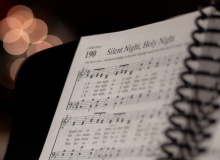


As we head into 2026, let’s prayerfully consider both our inability to influence and control everything and our desires for what we can shape about the year ahead.

When Christmas so saturates our understanding of everything that we dwell closely with the God who wants to dwell with us, when we preach we will be able to represent him better than ever before.

Surely our churches need to be encouraged to be good hearers of God’s Word as it is preached to them. But that same encouragement must also be pointed our way.

Let’s be sure to bring the most real concerns of our time to the Christmas story and find in it a Saviour who has learned what it is to be human.

Pray for each other, spend time with each other. Just because a handful of people take turns in the pulpit does not mean you have a preaching team.

We should preach topically. But it shouldn’t be our default. And when we do it, let’s be sure to really let the texts be in charge of the message.

Let’s read God’s Word and let it lift our eyes and our hearts. We have a God who has stepped into time and history and who will again.

It is the preaching of a passage that has saturated the heart and mind and life and preparation of the preacher.

The fruit of the grace of God is not merely legal, as amazing as that is, it is relational too.

Too many preachers are worth less than a fig because they are simplistic, or so complex that the gold seems hard to mine.

You can’t be a disciple from a distance. You can’t be disciple from merely observing externals. It takes that close relational bond to make the process work.

Pour out all the angst that is built up inside until there is nothing left. And then ask yourself, is the fire still burning in my heart and shut up in my bones?

Expository preaching should come from a passion for God’s inspired and relevant Word to be communicated clearly to specific people that they might respond to Him.

Here are my thoughts about some of the things people are saying about the murder of Charlie Kirk.
.jpg)
Let us be preachers who do not shy away from the work involved in our ministry, but let us also be preachers who never fail to pray at every stage in the process.

How can we have confidence in the Lord, strengthening our hearts as we wait for Him?

We need to lean fully into God’s Spirit to do what our best efforts can never do, to transform us and our listeners as we preach the Word.

Some preachers use the text as a launching point – they read the text and then preach an associated thought from their own thinking or theology.

If we simply instruct people how to behave and act like Christians, then they will co-opt and corrupt that instruction to serve their incurvedness.

Let the type of writing influence your type of preaching. Seek to do what it does, as well as say what it says.

When you are wrestling with a passage, be sure to distill the whole passage down into the passage idea.

Expository preaching is about effectively and accurately communicating the text, not using the text to offer a lecture in sermonic method or applied theology.
.jpg)
Peter Mead has got to know preachers throughout Europe over the last two decades. He is passionate about demonstrating that good biblical preaching changes people's lives. A blog for preachers and a podcast offer extensive practical training.

May we be ever more captivated by the glorious good news of God’s great love for us so that we are motivated to preserve it for others.

God gave us so much narrative in the Bible because of its power in engaging us with the wonder of his self-revelation.

Las opiniones vertidas por nuestros colaboradores se realizan a nivel personal, pudiendo coincidir o no con la postura de la dirección de Protestante Digital.